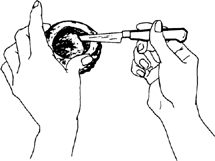Mastering the Art of French Cooking, Volume 2 (58 page)
Read Mastering the Art of French Cooking, Volume 2 Online
Authors: Julia Child

(*)
DELAYED-ACTION NOTE
: The formed pastry may be frozen at this point, and taken right from freezer to oven.
2)
Baking—20 to 25 minutes in a preheated 425-degree oven
Just before baking, paint top surfaces of
bouchées
, not the sides, with a double coating of egg glaze (1 egg beaten with 1 tsp water), and decorate with cross-hatch knife or fork marks. (See
vol-au-vent
,
step 2
.) Bake in the middle level of preheated oven about 25 minutes. They are done when risen and brown, and when the sides are brown and crisp. Remove to a rack.
With a sharp small knife held vertically, cut out covers with an up-and-down sawing motion |
|
3)
Storing and serving
The sooner you can fill and serve patty shells, the fresher, lighter, and more delicious they will be. If you are serving the same day, keep in a warming oven or the turned-off oven. Otherwise arrange in a covered pan and freeze them. To reheat and crisp shells, either frozen or not, preheat oven to 425 degrees, place shells on a lightly buttered baking sheet and set in middle level of oven. Turn oven off and shells will be crisp in 5 to 8 minutes.
VOL-AU-VENT
[
Large Patty Shell
]
A large patty shell is somewhat reminiscent of the oldtime
haute cuisine;
it is wonderfully dramatic to serve and always greatly enjoyed by your guests just because it is an unusual treat. The decorative cover, which is formed and baked separately, is optional and depends on how your table serving works out. If you have a cover, the filled
vol-au-vent
with cover poised on top of the food is presented for all to admire, then the cover must be removed to a separate dish for cutting and serving.
For an 8-inch shell about 5 inches deep, serving 6 people
1)
Forming the dough
The preceding recipe for 2½ lbs.
classic puff pastry
An 8-inch and a 5-inch round
vol-au-vent
cutter, pan cover, plate, or saucer for cutting circles of dough
A heavy rolling pin with rolling surface at least 14 inches long
A baking sheet or round pizza tray rinsed in cold water and not dried
1 or 2 baking sheets or trays in the refrigerator for leftover dough
Place chilled puff pastry on a lightly floured marble or pastry board and roll rapidly into a rectangle ⅜ inch thick, 12 inches wide, and 20 inches long. (To insure
that stresses and strains are equalized for even baking, be sure to roll dough crosswise as well as lengthwise.)
Work as rapidly as possible from now on so that dough will not soften and become difficult to handle; if it does soften, immediately stop whatever you are doing and refrigerate everything for 15 to 20 minutes, then continue.
Cut two 8-inch disks out of pastry, spacing them at least
½
inch from edges of dough and from each other
. Lift surrounding dough off the disks and arrange in one layer on baking sheet or tray and refrigerate; see directions for
re-forming it into puff pastry
.
| Roll one of the disks up on the pin and |





